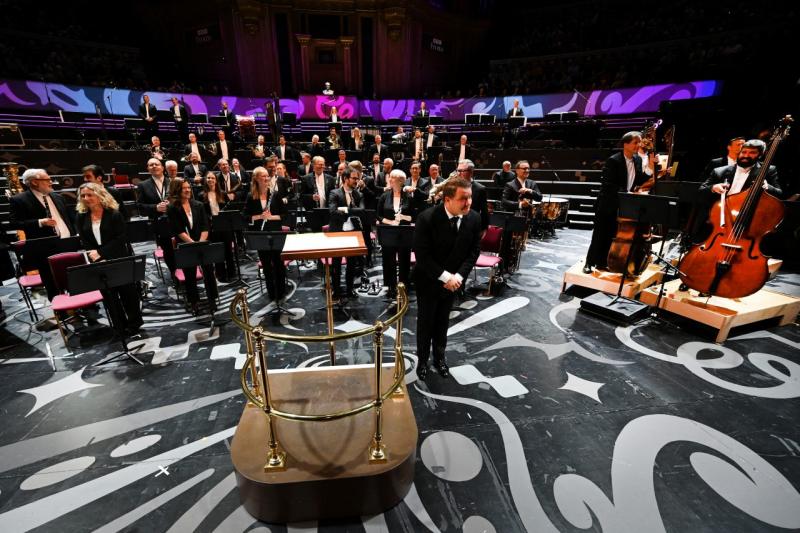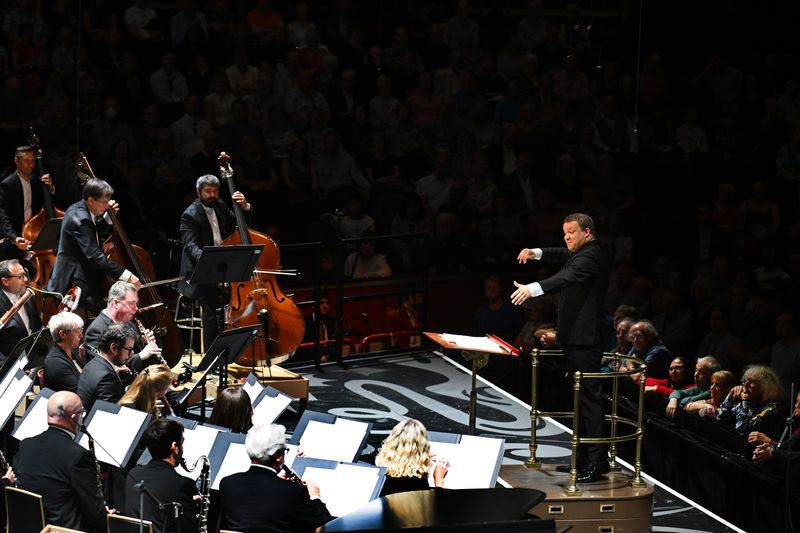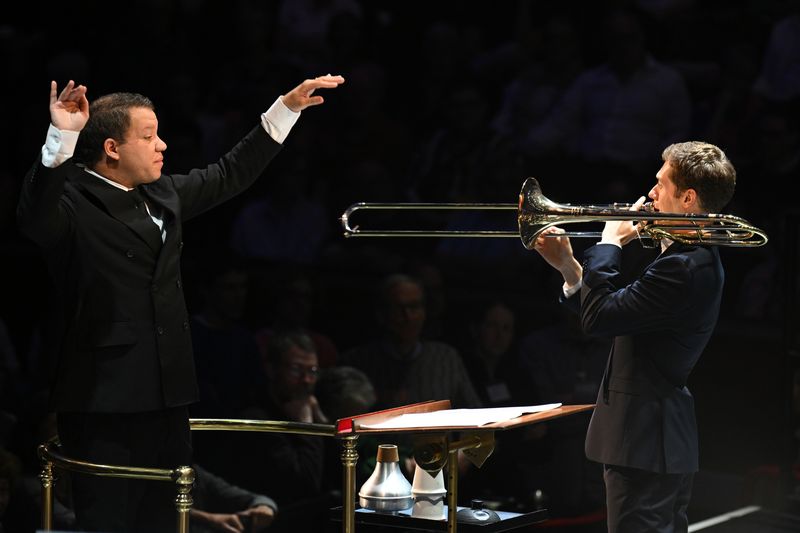BBC Proms: Moore, LSO, Bancroft review - the freshness of morning wind and brass | reviews, news & interviews
BBC Proms: Moore, LSO, Bancroft review - the freshness of morning wind and brass
BBC Proms: Moore, LSO, Bancroft review - the freshness of morning wind and brass
English concert band music...and an outlier

11am concerts do take some getting used to. The BBC Proms season has no fewer than seven of them this year, three on Saturdays and four on Sundays. And yet, strangely, for this programme, mainly consisting of works for concert band, it did genuinely seem like the right time of day.
This is open-hearted, maybe even community-minded music, and when it is played with the panache, joy and precision that the London Symphony Orchestra’s wind, brass and percussion brought to it, the feeling of morning freshness is undeniable.
That was particularly the case with the opener, Vaughan Williams’s English Folk Song Suite, written for Kneller Hall in 1923, which I can remember rehearsing and playing, revelling endlessly in its earworms, as a teenager. Everything from the LSO was wonderfully crisp and precise, especially some sizzlingly light interventions from the side drum. The candour and poise of James Fountain’s playing of the first cornet part was a particular joy throughout. The Suite is an exquisitely crafted piece, particularly the almost nonchalantly clever interweaving of four folk melodies in the third movement, “March: Folk Songs from Somerset”.  Equally deftly achieved was a less well-known piece, the first set of English Dances which Malcolm Arnold wrote for orchestra in 1950 and were later arranged for wind band by Maurice Johnstone. I know that angry letter-writers don’t normally need any encouragement, but if one of them were to berate Sam Jackson for the fact that an entire Proms season will only have included nine minutes of music by Malcolm Arnold...and what a travesty that is… he or she will definitely have a point. But what a great nine minutes it was: the ease of the first movement, the joy of the second, the inclusion of no fewer than seven clarinets of different dimensions, some wonderful dovetailing of melody between the lower saxes and the french horns in the ‘mesto’ movement More please...
Equally deftly achieved was a less well-known piece, the first set of English Dances which Malcolm Arnold wrote for orchestra in 1950 and were later arranged for wind band by Maurice Johnstone. I know that angry letter-writers don’t normally need any encouragement, but if one of them were to berate Sam Jackson for the fact that an entire Proms season will only have included nine minutes of music by Malcolm Arnold...and what a travesty that is… he or she will definitely have a point. But what a great nine minutes it was: the ease of the first movement, the joy of the second, the inclusion of no fewer than seven clarinets of different dimensions, some wonderful dovetailing of melody between the lower saxes and the french horns in the ‘mesto’ movement More please...
The last half an hour of the concert was given over to Percy Grainger, works for wind band from various stages of his adventurous life. This music is sometimes carefree, sometimes just busy, briefly irresistible in Country Gardens, melodically inventive in Lincolnshire Posy, but possibly outstayed its welcome.
This concert was to have been conducted by Sir Simon Rattle, but he had to withdraw at a few days’ notice for "routine surgery’" His replacement was Ryan Bancroft (pictured above with the players), who seemed very much at home in the repertoire. Bancroft is a brass player, and in his time as a conducting student in Glasgow, he played the trumpet professionally with the BBC Scottish Symphony Orchestra. His relationship with the LSO has definitely got off to a good start, but there was nevertheless one piece which left me wondering whether Simon Rattle might have brought more of his pzazz or charisma to it, and that was Tippett’s Paraphrase on Music from ‘The Mask of Time’ (1992). Might the trumpets have blazed more brightly? Might the ending have been more fervent? It's impossible to tell.  The programme had one curious outlier, the trombone concerto Eine kleine Posaunenmusik (1980) from the American “third stream” composer Gunther Schuller (1925-2015), in which the unifying constant is a repeated reference to a specific tone row. The fact that the orchestral forces are so unusual (including harp and harpsichord) is probably one factor behind the fact that performances are rare, even allowing for the global shortage of trombone concertos. The orchestral writing of the more energetic movements has the spirit of Webern in its sparseness, with vanishingly brief interventions and chirrups from all over the orchestra, and a high-lying and virtuosic solo part.
The programme had one curious outlier, the trombone concerto Eine kleine Posaunenmusik (1980) from the American “third stream” composer Gunther Schuller (1925-2015), in which the unifying constant is a repeated reference to a specific tone row. The fact that the orchestral forces are so unusual (including harp and harpsichord) is probably one factor behind the fact that performances are rare, even allowing for the global shortage of trombone concertos. The orchestral writing of the more energetic movements has the spirit of Webern in its sparseness, with vanishingly brief interventions and chirrups from all over the orchestra, and a high-lying and virtuosic solo part.
Peter Moore (pictured above with Bancroft) has a gentleness on the instrument which allowed him to make a strong case for the piece. The slow movement, “Chorale”, is extraordinary, with the clarinet section seeming to make an explicit reference the Berg Violin Concerto, and the tantric woodwind writing demands superhuman feats of breath control. Moore also played an encore, “Etudes” for trombone by David Uber; solo trombone is a glorious sound in the Royal Albert Hall.
All sections received deserved and warm applause at the end, especially the percussion. If this concert turns out to signal the start of an annual 11am Proms concert band strand… it can, in all seriousness, only be a good thing.
rating
Explore topics
Share this article
The future of Arts Journalism
You can stop theartsdesk.com closing!
We urgently need financing to survive. Our fundraising drive has thus far raised £49,000 but we need to reach £100,000 or we will be forced to close. Please contribute here: https://gofund.me/c3f6033d
And if you can forward this information to anyone who might assist, we’d be grateful.

Subscribe to theartsdesk.com
Thank you for continuing to read our work on theartsdesk.com. For unlimited access to every article in its entirety, including our archive of more than 15,000 pieces, we're asking for £5 per month or £40 per year. We feel it's a very good deal, and hope you do too.
To take a subscription now simply click here.
And if you're looking for that extra gift for a friend or family member, why not treat them to a theartsdesk.com gift subscription?
more Classical music
 BBC Proms: Alexander’s Feast, Irish Baroque Orchestra, Whelan review - rapturous Handel fills the space
Pure joy, with a touch of introspection, from a great ensemble and three superb soloists
BBC Proms: Alexander’s Feast, Irish Baroque Orchestra, Whelan review - rapturous Handel fills the space
Pure joy, with a touch of introspection, from a great ensemble and three superb soloists
 BBC Proms: Moore, LSO, Bancroft review - the freshness of morning wind and brass
English concert band music...and an outlier
BBC Proms: Moore, LSO, Bancroft review - the freshness of morning wind and brass
English concert band music...and an outlier
 Willis-Sørensen, Ukrainian Freedom Orchestra, Wilson, Cadogan Hall review - romantic resilience
Passion, and polish, from Kyiv's musical warriors
Willis-Sørensen, Ukrainian Freedom Orchestra, Wilson, Cadogan Hall review - romantic resilience
Passion, and polish, from Kyiv's musical warriors
 BBC Proms: The Marriage of Figaro, Glyndebourne Festival review - merriment and menace
Strong Proms transfer for a robust and affecting show
BBC Proms: The Marriage of Figaro, Glyndebourne Festival review - merriment and menace
Strong Proms transfer for a robust and affecting show
 BBC Proms: Faust, Gewandhausorchester Leipzig, Nelsons review - grace, then grandeur
A great fiddler lightens a dense orchestral palette
BBC Proms: Faust, Gewandhausorchester Leipzig, Nelsons review - grace, then grandeur
A great fiddler lightens a dense orchestral palette
 BBC Proms: Jansen, Royal Concertgebouw Orchestra, Mäkelä review - confirming a phenomenon
Second Prom of a great orchestra and chief conductor in waiting never puts a foot wrong
BBC Proms: Jansen, Royal Concertgebouw Orchestra, Mäkelä review - confirming a phenomenon
Second Prom of a great orchestra and chief conductor in waiting never puts a foot wrong
 BBC Proms: Royal Concertgebouw Orchestra, Mäkelä review - defiantly introverted Mahler 5 gives food for thought
Chief Conductor in Waiting has supple, nuanced chemistry with a great orchestra
BBC Proms: Royal Concertgebouw Orchestra, Mäkelä review - defiantly introverted Mahler 5 gives food for thought
Chief Conductor in Waiting has supple, nuanced chemistry with a great orchestra
 Dunedin Consort, Butt / D’Angelo, Muñoz, Edinburgh International Festival 2025 review - tedious Handel, directionless song recital
Ho-hum 'comic' cantata, and a song recital needing more than a beautiful voice
Dunedin Consort, Butt / D’Angelo, Muñoz, Edinburgh International Festival 2025 review - tedious Handel, directionless song recital
Ho-hum 'comic' cantata, and a song recital needing more than a beautiful voice
 Classical CDs: Dungeons, microtones and psychic distress
This year's big anniversary celebrated with a pair of boxes, plus clarinets, pianos and sacred music
Classical CDs: Dungeons, microtones and psychic distress
This year's big anniversary celebrated with a pair of boxes, plus clarinets, pianos and sacred music
 BBC Proms: Liu, Philharmonia, Rouvali review - fine-tuned Tchaikovsky epic
Sounds perfectly finessed in a colourful cornucopia
BBC Proms: Liu, Philharmonia, Rouvali review - fine-tuned Tchaikovsky epic
Sounds perfectly finessed in a colourful cornucopia
 BBC Proms: Suor Angelica, LSO, Pappano review - earthly passion, heavenly grief
A Sister to remember blesses Puccini's convent tragedy
BBC Proms: Suor Angelica, LSO, Pappano review - earthly passion, heavenly grief
A Sister to remember blesses Puccini's convent tragedy
 BBC Proms: A Mass of Life, BBCSO, Elder review - a subtle guide to Delius's Nietzschean masterpiece
Mark Elder held back from blasting the audience with a wall of sound
BBC Proms: A Mass of Life, BBCSO, Elder review - a subtle guide to Delius's Nietzschean masterpiece
Mark Elder held back from blasting the audience with a wall of sound

Add comment